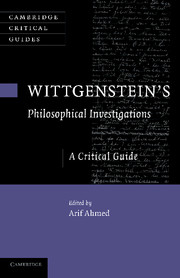Book contents
- Frontmatter
- Contents
- List of contributors
- Acknowledgments
- Introduction
- 1 From referentialism to human action: the Augustinian theory of language
- 2 What's doing? Activity, naming and Wittgenstein's response to Augustine
- 3 Measure for measure? Wittgenstein on language-game criteria and the Paris standard metre bar
- 4 Wittgenstein on family resemblance concepts
- 5 Wittgenstein on concepts
- 6 Wittgenstein vs contextualism
- 7 Wittgenstein and the linguistic turn
- 8 Rorty's Wittgenstein
- 9 Are meaning, understanding, etc. definite states?
- 10 Another strand in the private language argument
- 11 Deductive inference and aspect perception
- 12 Remembering intentions
- Bibliography
- Index
8 - Rorty's Wittgenstein
Published online by Cambridge University Press: 06 July 2010
- Frontmatter
- Contents
- List of contributors
- Acknowledgments
- Introduction
- 1 From referentialism to human action: the Augustinian theory of language
- 2 What's doing? Activity, naming and Wittgenstein's response to Augustine
- 3 Measure for measure? Wittgenstein on language-game criteria and the Paris standard metre bar
- 4 Wittgenstein on family resemblance concepts
- 5 Wittgenstein on concepts
- 6 Wittgenstein vs contextualism
- 7 Wittgenstein and the linguistic turn
- 8 Rorty's Wittgenstein
- 9 Are meaning, understanding, etc. definite states?
- 10 Another strand in the private language argument
- 11 Deductive inference and aspect perception
- 12 Remembering intentions
- Bibliography
- Index
Summary
Most of the vast literature on Wittgenstein addresses what he fundamentally meant. And some of it goes on to consider whether or not his core ideas are correct. But Richard Rorty's interest is rather different. As a pragmatist what he wants to know is how Wittgenstein's legacy has been fruitful, which of his writings have proved most useful, which strands of putatively Wittgensteinian thought have pointed us in worthwhile directions.
The main substance of his ‘Wittgenstein and the linguistic turn’ is a comparison between two competing answers to this question: one that privileges Wittgenstein's anti-theoretical metaphilosophical remarks, his identification of philosophical problems with diseases of thought calling for a form of therapy; and the other response – which Rorty himself had come to favour – that privileges Wittgenstein's view of languages as instrumental social practices and takes this to be an important theoretical advance, a proposal that greatly improves on prior accounts of language and meaning (such as the referential theory in his Tractatus).
As I've indicated – but it's worth saying again – these contrasting reactions are not offered by Rorty as alternative interpretations – as conflicting claims about what Wittgenstein himself intended. Rather, they are offered as conflicting opinions as to what is valuable in his work. They lead to different ways of being a Wittgensteinian. Those whom Rorty calls ‘the Wittgensteinian therapists’ will indeed disagree with those he calls ‘the pragmatic Wittgensteinians’ over the proper construal of this or that passage.
Keywords
- Type
- Chapter
- Information
- Wittgenstein's Philosophical InvestigationsA Critical Guide, pp. 145 - 161Publisher: Cambridge University PressPrint publication year: 2010
- 1
- Cited by

